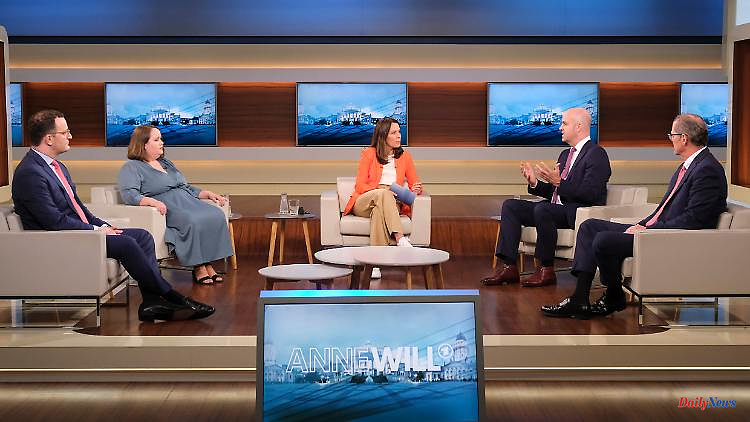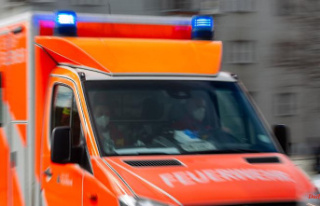Who should be preferred in the supply of natural gas in winter? consumer or industry? The talk round at Anne Will agrees: a compromise is needed. But how exactly that should look like and what politicians should do when and how, there is no solution.
It is clear that a talk show cannot solve world-shattering problems in 60 minutes. Nobody has that claim. But if the inclined viewer at the end of such a show has more questions than before, that can't be the point of the whole thing. On Sunday evening, Anne Will will talk to her guests about how to deal with and ways out of the gas crisis. She is presented with a variety of answers that always draw the same loops of deadlocked lines of argument. Such a format does not contribute to less uncertainty.
Of course it doesn't have to be. After all, that is the task of politics. And it is currently confronted with particularly uncertain times. The Ukraine war is in full swing and is being waged by the Russian side with no regard for losses or human lives. In addition to the latent fear of an escalation of the situation beyond the borders of the Ukrainian state, high inflation and difficulties with the gas supply are causing headaches for politics, business and society in Germany. Consumers are wondering how much longer they will be able to pay their energy bills and their weekly shopping. In the end, people have to decide whether they prefer to freeze or eat less, Anne Will asks her panellist.
According to Marcel Fratzscher from the German Institute for Economic Research (DIW), Germany has a double problem: there is a relatively high level of income poverty and 35 to 40 percent of the population have practically no savings. This affects not only those who live on basic security, but also the middle class. Will addresses the federal government's relief packages that have already been put together and asks whether they were enough. For Fratzscher they are "of course better than nothing". In his opinion, however, more targeted and, above all, measures should be decided that will still be effective in three months.
He calls the much-maligned tank discount the "original sin of all measures" because there is a redistribution from bottom to top. There is also no incentive to save. Higher social benefits, such as 100 euros per capita, have a more targeted effect on those who really need it. "Only permanently high incomes can help right now."
The measures that have been decided so far get a rather bad report that evening. The leader of the Greens, Ricarda Lang, does not have it easy as a representative of the traffic light coalition. She announces further plans for the fall and winter. "We have to be more targeted," she says, referring to measures that help those whom Fratzscher mentioned earlier: people on low incomes and without savings. It is about preventing a "poverty wave".
She admits that the coalition members have a communication problem and warns that negotiations about measures to be taken must not be fought out in public. But that is exactly what is currently being done, for example when Green Environment Minister Steffi Lemke proposes a moratorium on electricity and gas cuts and her FDP cabinet colleague Marco Buschmann, who is Minister of Justice, immediately rejects this idea.
Next to Lang is CDU politician Jens Spahn, who is in the privileged position of evaluating others in crisis mode for a change. His verdict isn't particularly good either. His successors in government offices lack a plan as to where things should actually go. For example how Russian gas should be replaced. Crisis management is about constantly adapting the strategy to the circumstances, says the former Minister of Health. "We get a new proposal every day, but nothing is decided." Chancellor Olaf Scholz must make the supply problem his priority. After the much-vaunted concerted action with the federal government, employers and unions, nothing happened.
Employer President Rainer Dulger was one of the people who attended the meeting in early July. He welcomes the speech format and reassures that it was just the "kick-off meeting". It was about a common understanding of the problem. Presenter Will confronts him with the seriousness of the situation and the words he used in an interview just a few days ago: "We are facing the biggest crisis the country has ever had." The fluctuating security of supply with energy sources such as gas poses great challenges for society. Can higher wages help counter rising prices?
Dulger declines. He warns of a wage-price spiral and companies that are already at the limits of what is feasible. "We just don't know which fire to put out first." Marcel Fratzscher cannot let that stand. The wage-price spiral is a false myth. It could happen, "but I don't see it at the moment." Rather, higher wages are the best instrument in this crisis, because it means people have more money in their pockets and can decide for themselves what they need it for.
"We all want a secure job and a warm home," says Dulger. It needs a combination of both. If there were no jobs in industry, no wages would be paid and the social security funds would not be filled. A "reasonable solution" had to be found for this complex problem. "Populist snap shots" are out of place. Jens Spahn proposes reducing certain taxes, such as the electricity tax, as a possible relief for citizens. He and Lang agree that an energy price cap for the basic needs of a household can also make sense.
But what can be done on the other side? Where does Germany get more energy from? There follows a pros and cons between Spahn and Lang as to whether nuclear power should be retained as an option even after the announced shutdown date of the three remaining reactors. The CDU member of the Bundestag takes the position that can sometimes also be heard from the ranks of the FDP: the nuclear power plants should stay longer on the grid.
Green leader Lang is implacable about the whole thing, but holds out the prospect of another stress test, which should check with an open outcome whether there are certain signs of a power shortage and whether continued operation might be necessary. She doesn't say that directly, not even despite repeated inquiries from Anne Will. But she wants to keep all options open, emphasizes Lang.
The FDP accuses the Green politician of worrying about poll numbers and therefore deviating from the coalition's "clear base line" on the matter. In the event of a gas shortage in winter, the electricity from the nuclear power plants does not help because it cannot be used flexibly and cannot solve the problem of the lack of heat due to too little natural gas anyway, she argues. And with a view to the cost-benefit analysis (liability risk of the operator, waiver of safety standards, new fuel rods, etc.), nuclear power should be rejected anyway. Spahn sees it very differently and speaks against it. Only the closing words of moderator Will can silence the irreconcilable discussants.
With a share of only six percent in total German electricity production, nuclear power gets a big place, both in the program and in the public debate. Unfortunately, this leads us past the main topic of ways out of the gas crisis. Discussions like these are not only tiring, they are also unsettling and raise questions. A person with expertise who independently evaluates what was said would have done the show good. DIW President Fratzscher put it in a nutshell: Germany is harming itself with the continuing uncertainty. A concrete plan is needed so that companies and consumers know what they have to prepare for in the future.
(This article was first published on Monday, July 18, 2022.)












